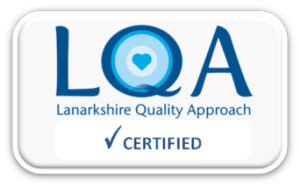Understanding Your Kidney Bloods
Information for patients
NHS Lanarkshire Dietetic Department
PIL.BLOODS.02858.L
eGFR
This estimates how well your kidneys are working. As kidney function gets worse, the creatinine goes up and the eGFR goes down.
Creatinine
This is used to measure kidney function, it comes from the muscle and is called creatinine. Creatinine is made when we use our muscles. It is a waste product that the kidney tries to get rid off. The normal level is between 60-110ummol per litre. However as your kidney function deteriorates your creatinine will rise.
Urea
This is also a waste product that the kidneys try to also get rid off. Urea is a left over waste product after we eat protein. This level in the blood indicates how well our kidneys are working by getting rid of it. A normal urea is between 2.5-7.8mmol per litre.
Bicarbonate
The kidneys help keep the acid level of the blood correct. The bicarbonate level tells us this. Your blood bicarbonate level should be about 22-29mmol per litre. If your kidneys are not working well, then this level can drop.
This is not good so your renal doctor may start you on medication to help such as sodium bicarbonate.
Potassium (K)
Potassium comes from your diet. High levels can be dangerous causing your heart to stop. The kidneys help control this level but if they are not working well then your potassium level can get too high. Your dietitian or doctor will put you on a low potassium diet. Normal potassium level is 3.5- 5.0mmol per litre.
Phosphate (PO4)
Phosphate comes from our diet. The kidneys help control this too. When your kidneys function goes down your phosphate level goes up. This can cause itchy skin, painful joints, red eyes, weakened bones and hard blood vessels. Causing damage to your heart, lungs and circulation. Phosphate should be controlled by a low phosphate diet and phosphate binders if required. Normal phosphate is 1.0-1.4mmol per litre.
Calcium (Ca)
When phosphate levels go up, calcium levels tend to fall, however it is important that the balance is correct between calcium and phosphate. Calcium helps the bones to stay healthy. The normal level is 2.1-2.6mmol per litre.
Parathyroid Hormone (PTH)
PTH controls the calcium and phosphate level in the blood. It is needed to keep the bones and blood vessels healthy. It is made up by four glands in your neck. If you have low levels of calcium and or high levels of phosphate in your blood for too long, these glands grow and start producing PTH. The level of PTH in the blood is the best indicator of how much damage has been done to the bones. Diet and medication can help. Your level should be 15-30 pmol per litre ideally.
Blood Pressure
High blood pressure makes the heart work harder and can damage blood vessels in the kidney and make your kidney function get worse. Make sure you take your medication and follow a no added salt diet. Your Doctor will tell you what level is acceptable for you.
HbA1c
If you have diabetes this measures your blood sugars over a three month period. Your levels should be between 20-42 mmol/mol
A high HbA1c will cause your kidney function to worsen quicker.
Haemoglobin (Hb)
Your kidneys produce a hormone called erythropoietin which helps stimulate the red blood cells in the bone marrow. When your kidney function declines this does not happen so well and as a result you become anaemic. This causes you to feel tired, feel the cold, breathless and loose concentration. Your anaemia nurse/renal doctor will put you on iron medication or injections to help this. Level 100-120g per litre.
Pub. date: February 2022
Review date: February 2024
Issue No: 04
Reference: PIL.BLOODS.02858.L
22_01329
If you need this information in another language or format, please e-mail:




